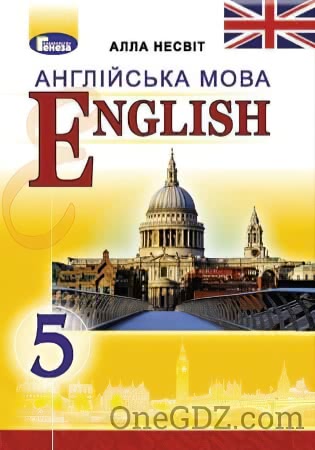
ГДЗ Англійська мова 5 клас Несвіт А.М. 2018 рік (Нова програма)
ГДЗ Англійська мова 5 клас
Unit 8. Holidays and Traditions (Lessons 7-8)
Page. 175 Ex. 3
1) 14th of February;
2) in Europe more than 600 years ago;
3) about 200 years ago;
4) a message of friendship and love;
5) send cards or give presents to those they love;
6) share lovely short messages.
Page. 174 Ex. 1
1. My mother always cooks holiday meals on New Year’s Day.
2. In Britain children usually wear special clothes at Halloween.
3. I like my birthdays because my relatives and friends always give me presents and my mother makes a tasty birthday cake.
4. In Britain people usually cook a turkey, prepare a Christmas pudding, decorate a Christmas tree, hang up stockings and sing carols at Christmas.
5. Our family has a tradition to gather for a holiday dinner at Easter.
6. In Britain Easter Bunny brings chocolate eggs.
7. On Mother’s and Father’s Days I make holiday cards for my parents.
8. It's a tradition to send holiday cards with a message of friendship and love on St Valentine’s Day.
Page. 175 Ex. 3
1) 14th of February;
2) in Europe more than 600 years ago;
3) about 200 years ago;
4) a message of friendship and love;
5) send cards or give presents to those Ihey love;
6) share lovely short messages.
Page. 175 Ex. 5
1) the party;
2) a great time;
3) costumes;
4) funny;
5) games;
6) the flour;
7) food;
8) lemonade;
9) join.
Dan and Ann are not in the same place.
Page. 176 Ex. 6
A: Is the party going well?
B: Yes, it’s wonderful. We are having a great time.
A: Are you all wearing costumes?
B: Yes, we are. I am a mermaid.
A: Really? I think you look beautiful. What are you doing now?
B: We are singing karaoke at the moment.
A: What about food? What are you eating?
B: Well, there are lots of biscuits, cakes and tea.
A: I’d like to join you. See you in thirty minutes!
Page. 176 Ex. 7
Today as Valentines go out,
To people near and far,
This one I’m sending right to you, To say how nice you are.
Page. 176 Ex. 8
1) wanted;
2) asked;
3) said;
4) were;
5) is;
6) was;
7) opened;
8) screamed;
9) danced;
10) was.